Contractor Website Tips: 7 Components of a Lead-Generating Site
As a contractor, there are some must-haves for your website, from an “About Us” page to a portfolio of your work


For potential customers, the first impression of your company is your website. Yet, as a contractor, you may feel that a website isn't necessary and word-of-mouth or other marketing efforts are enough to keep your business afloat. But when you consider that 85% of Americans say they go online daily, according to Pew Research, it makes sense to have a contractor website.
Why Contractors Need a Website
"Near me" and "where to buy" queries grew over 200% between 2019 and 2020. People scour the internet to find local companies, which shows why it's so essential you represent your company online. If they can't find you, they may move on to another contractor with a web presence.
Other reasons why your contractor business needs a website might include:
Enhances the Visibility of Your Company
One of the most significant benefits of your website is building recognition and visibility for your company. You've worked hard to gain the trust of your customers. You want your website to portray your business as trustworthy—the best in the industry for the service you provide.
Sets You Apart From the Competition
Today's customers rely primarily on the web to find local products, services, discount offers, pricing, reviews, and more. Whether you’re an electrician or a drywaller, your company’s website can target potential customers and show how your company fills the gap in the marketplace. It also gives you a way to share your knowledge and expertise with your customers.
Showcases Your Services
Your website is the best way to showcase your services to potential customers. Highlight your core values, what services you provide, and what advantages you have over your competitors. Show off reviews and recommendations and provide contact information, photos, and videos of past jobs.
Post your Angi badge on your website to drive reviews and give users access to your visitor profile page.
Gives Customers Access to Your Business
Your contractor website is available 24/7 to your customers. Any information you share becomes easily accessible, which leaves a positive impression on web visitors. Customers looking for a contractor in their area, from an HVAC technician to a landscaper, can easily search for information and get answers to their questions.
7 Contractor Website Must-Haves
In the world of contracting, you may rely on referrals and recommendations to bring in more work. Word of mouth and knocking on doors can only go so far today for general contractors. To market your business to the largest audience, you need a website. If you already have a website, you might want to update content and photos often.
Your contractor website should include the following essential, lead-generating pages:
1. Home Page
Your home page is the first page people see when they log into your site. It is the first impression of your company. Usually, it includes a navigation bar that provides links to other pages of your website. Make your home page a feast for the eyes by using photos, videos, or infographics. If people are going to seek out your company, make it worth their effort.
You might even include your social links on the home page of your website to Facebook, Twitter, Instagram, YouTube, and Pinterest. As a result, customers can engage with you, read reviews, and see news and updates, all while you increase your company's visibility.
Contractor Website Example
Midwest remodeling company Your Home Improvement Company has an impressive home page example that highlights the company's expertise, how to get a free quote or job estimate, what they do, testimonials, and even an "enter to win" sweepstakes offer that pops up.
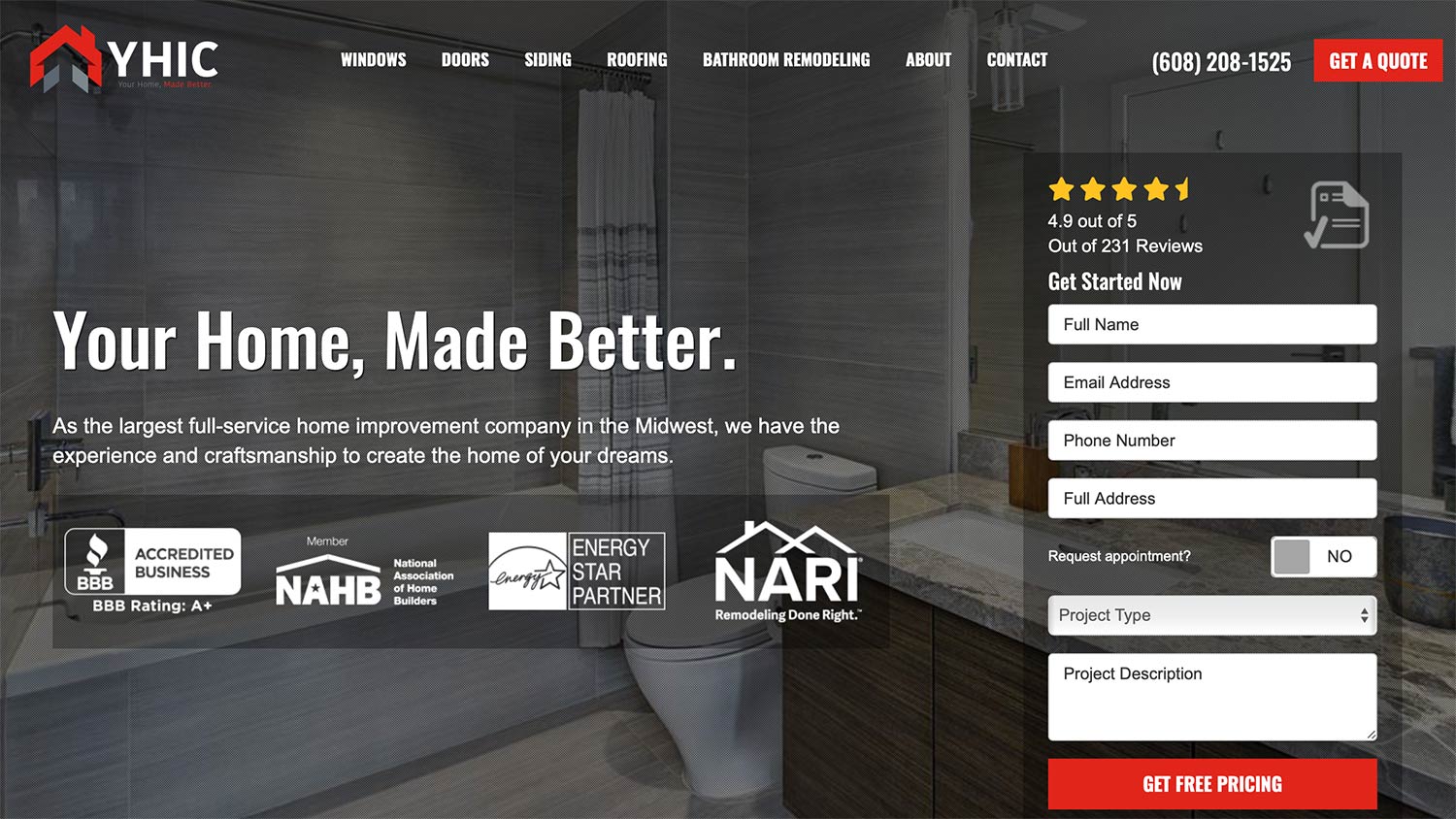
2. About Us Page
An About Us page allows you to recognize your customers' pain points and show them how you can provide the solution. It also provides the chance to talk about the history of your company, your expertise, who you are, awards, badges, and complementary companies you may work with. Social icons and customer ratings make this page even more robust.
Contractor Website Example
Beissel Window & Siding, a family-owned window and siding company in St. Paul and Minneapolis, has a clean and straightforward About Us page. It highlights why customer satisfaction is so important, shows a map of their location, and highlights its services. A photo of the company sign makes the business approachable and friendly.
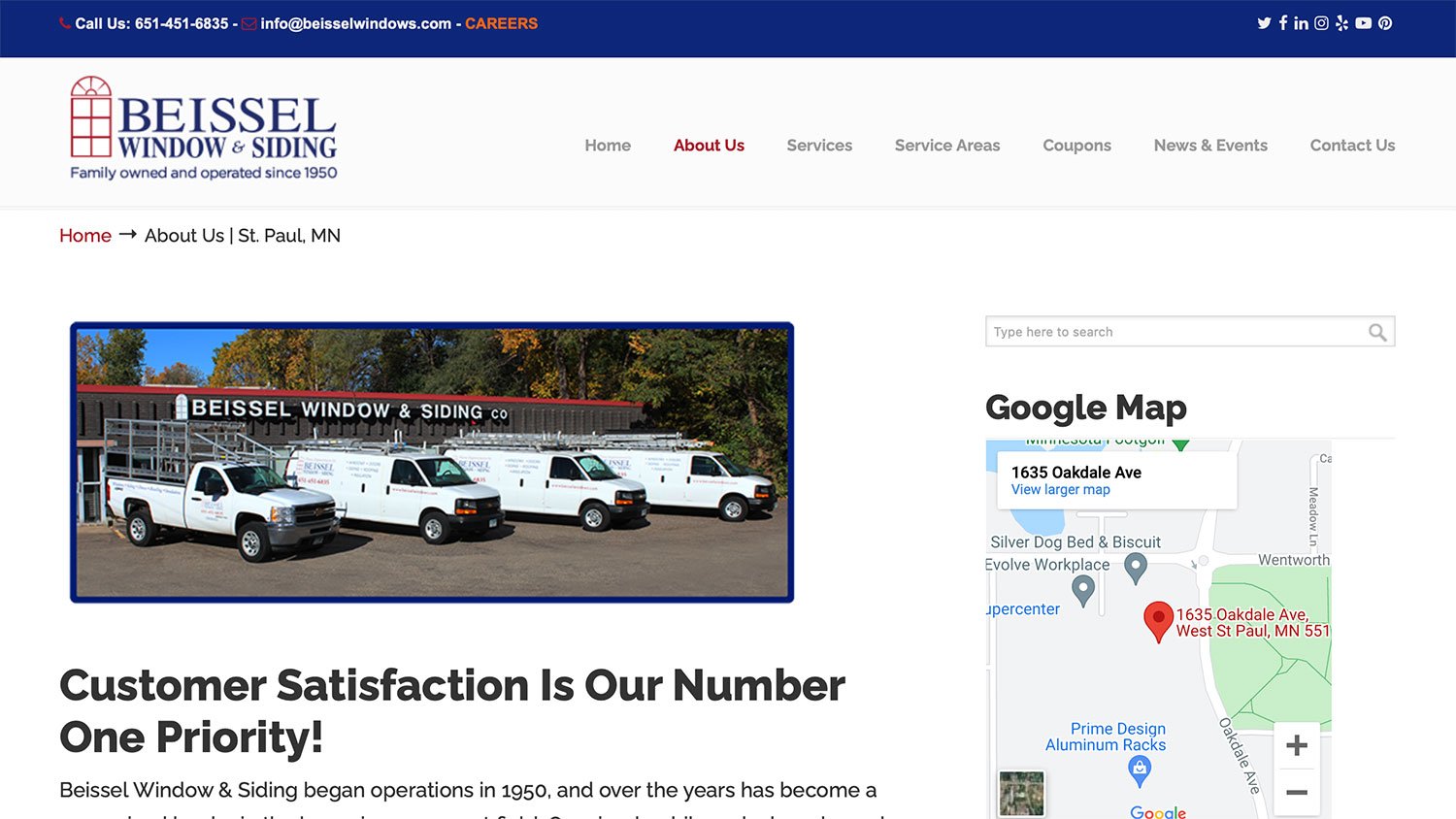
3. FAQs
A frequently asked questions (FAQ) page gives you the chance to answer common questions for customers. It can also save you time on the job or when taking a phone call. FAQs should show your expertise and address customer questions and concerns.
Contractor Website Example
Structured Foundation Repairs, a foundation repair company located in Minnesota, has a designated FAQ page with nearly a dozen questions about foundations, from the average job cost to insurance information.
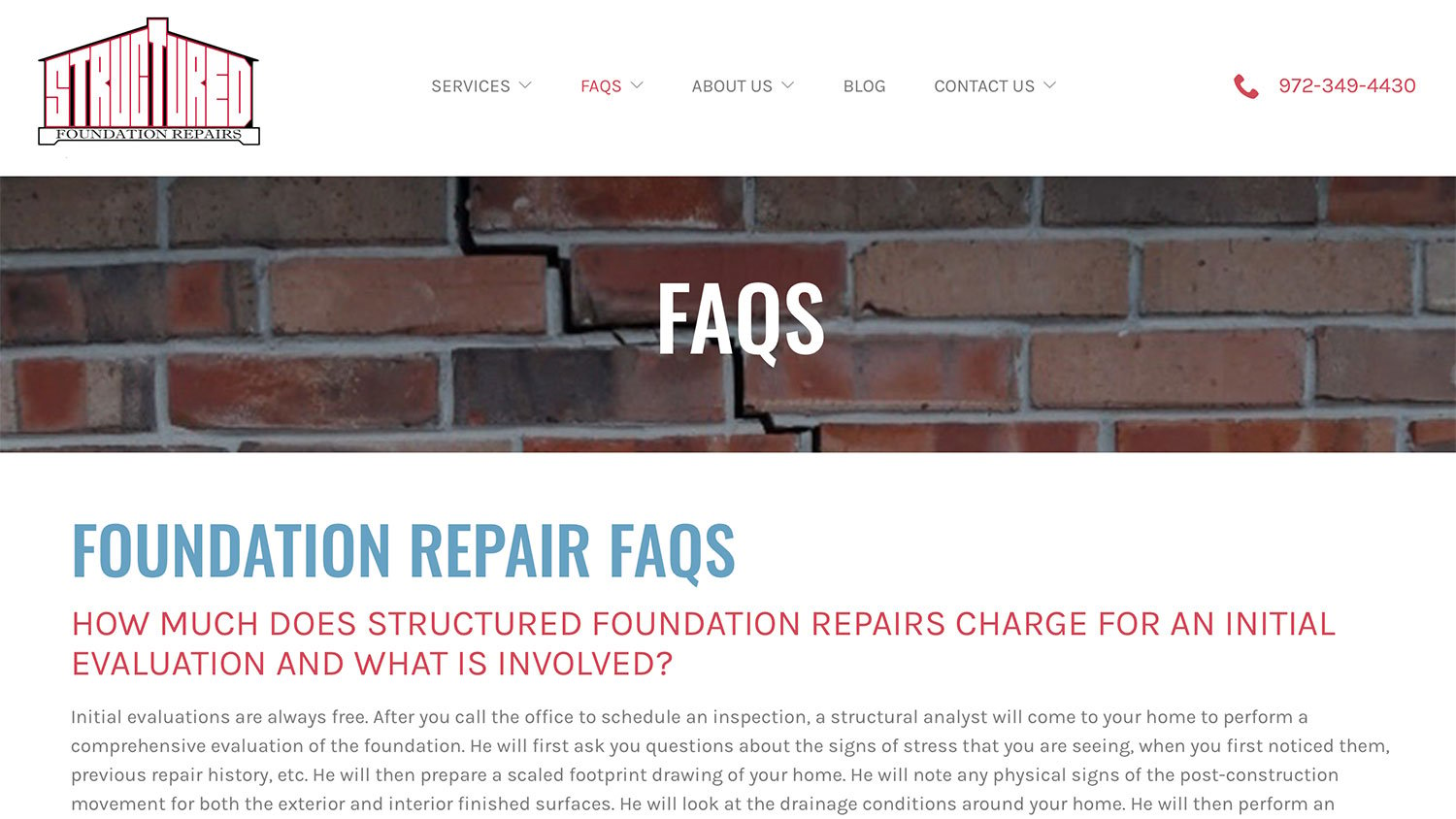
4. Example Projects/Portfolio Page
It’s common for contractors of all types to highlight example projects on their websites. People like to see before and after photos, a project gallery, and possibly a video showing the transformation of a project, your past customers, what you do, and how your company stands out.
Contractor Website Example
On the home page of Mattox Home Solutions, a residential design company, you'll find a menu bar with a link to the company's various projects showing before photos, concept illustrations, and completed project photos.
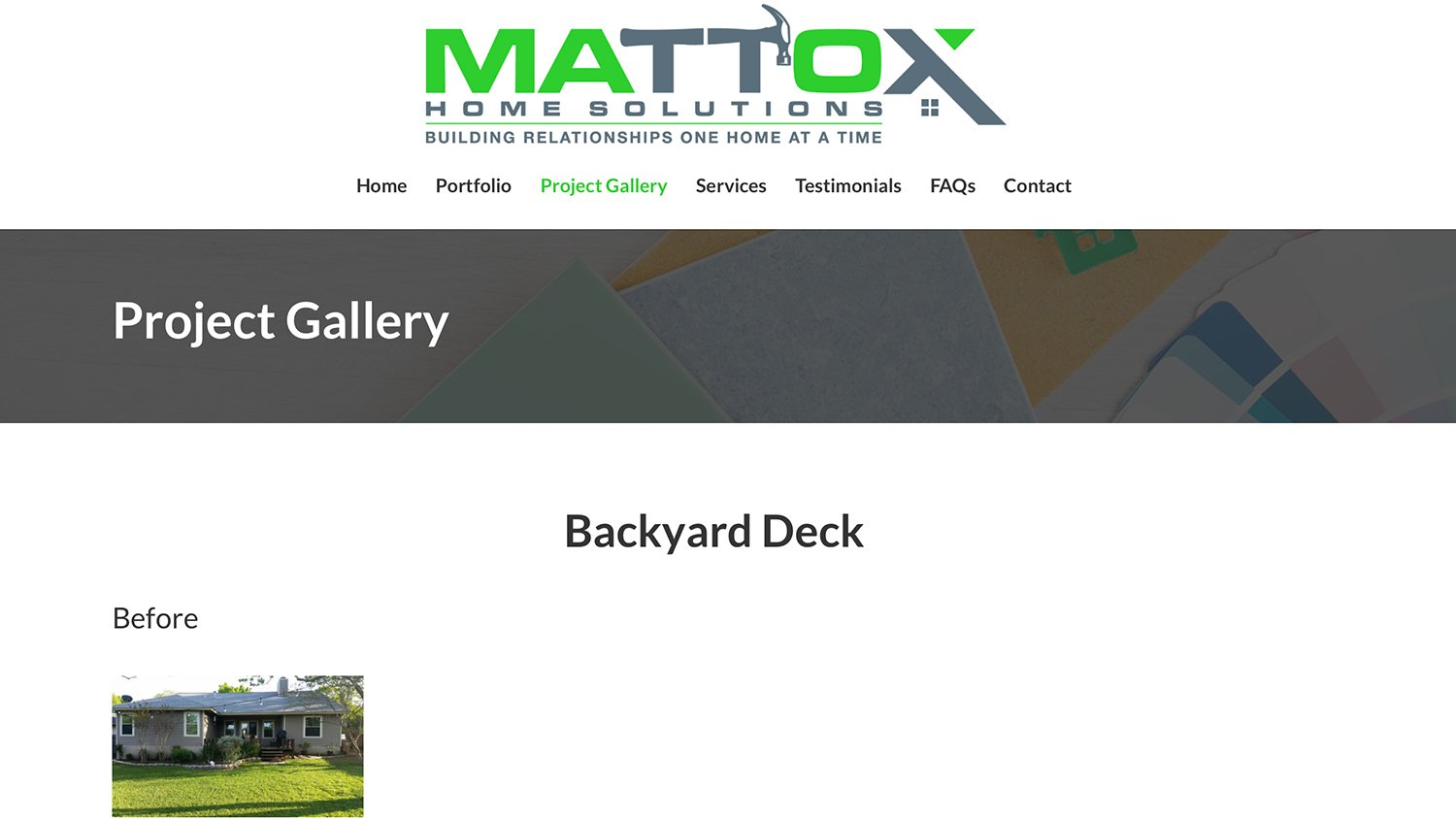
5. Blog
Not all contractors have a blog. In fact, you may question if a blog is even necessary as part of your total marketing plan. However, a contracting blog is an excellent way to connect with customers, answer questions, and inform website visitors on industry updates and new products.
Contractor Website Example
Structured Foundation Repair's blog is informative and educational, covering subjects like foundation problems and roof drainage systems.
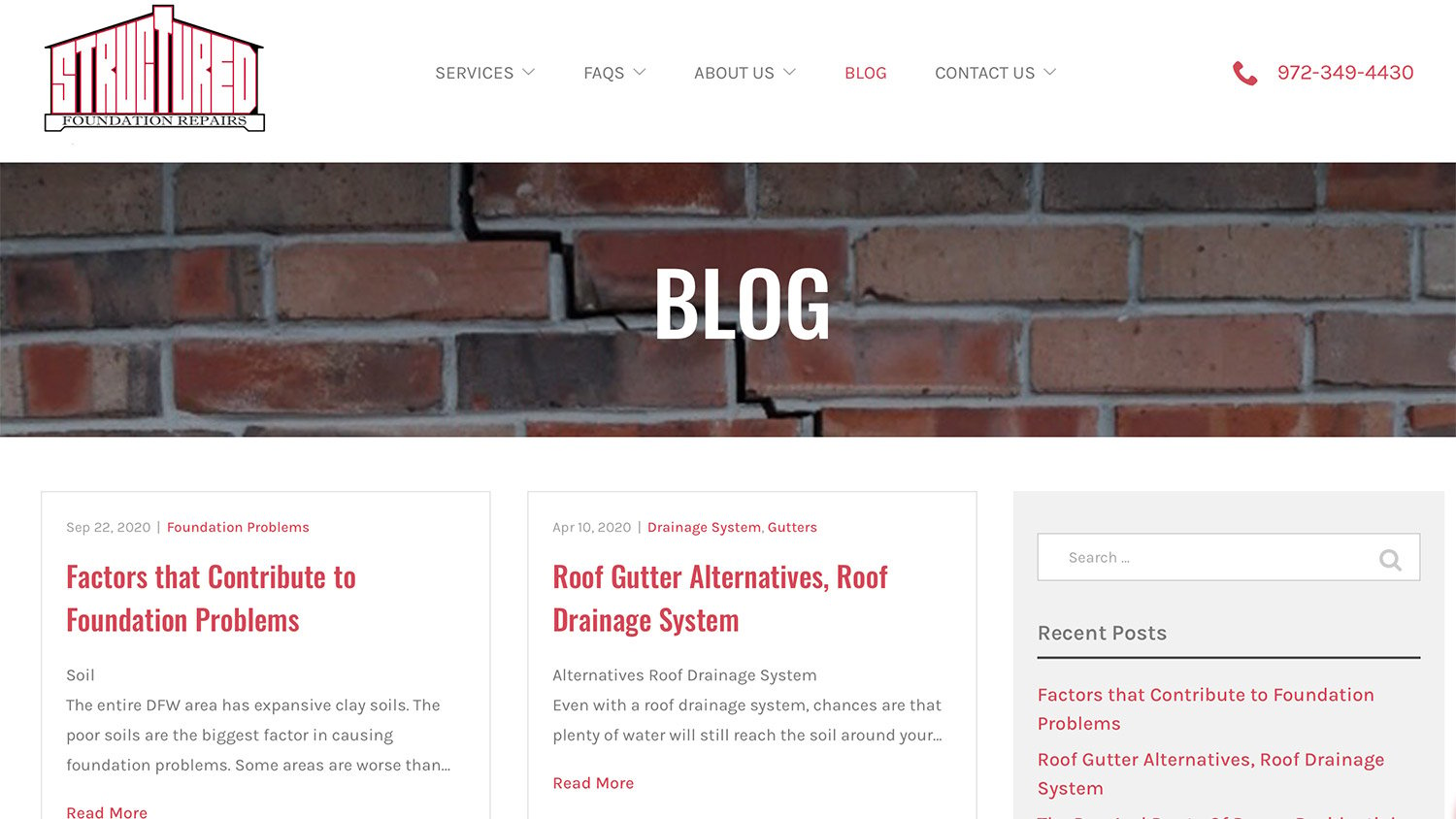
6. Customer Testimonials
Testimonials, referrals, and customer recommendations can be your best marketing tools. People are more likely to trust you and your company if other people have trusted you in the past. Some websites put testimonials right up front on the home page, while others have a link to another page.
Contractor Website Example
Austad Construction, a new roofing and repair provider in the greater Minnesota area, has a dedicated testimonial page that you can reach via the menu bar on the home page.
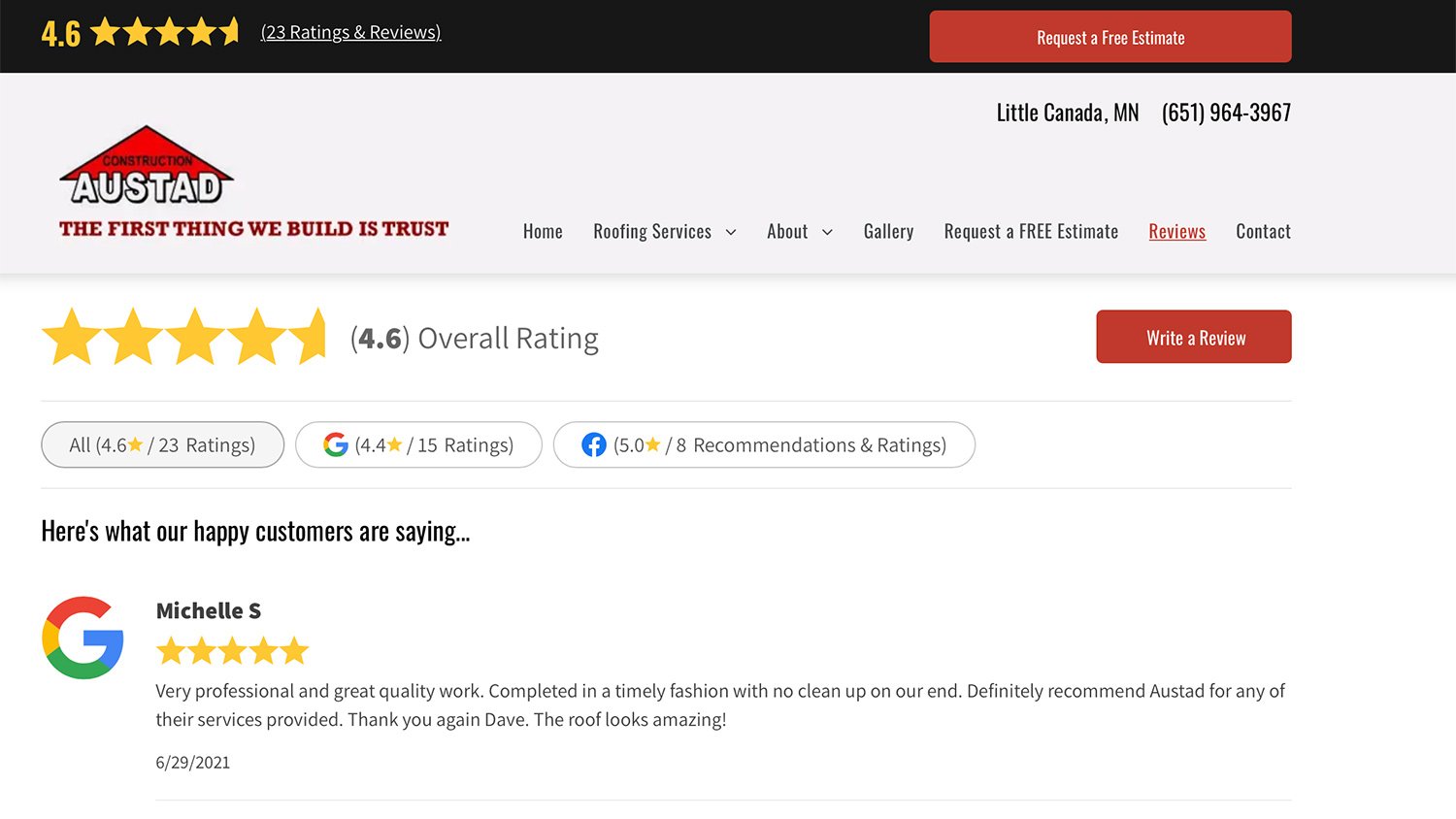
7. Contact Us
The Contact Us page on your website is the page where you highlight your location(s) and contact information. You might include a map of each location, your hours of operation, phone numbers, and physical address. Some contractor websites also have this information in plain sight on their home page.
Contractor Website Example
Besides a phone number, hours of operation, and address, Your Home Improvement Company also has a bar under each location that says “Send Message” and “Get Directions” that opens a popup box. Not a bad idea if you have many locations or want to offer a way for people to contact you via email.
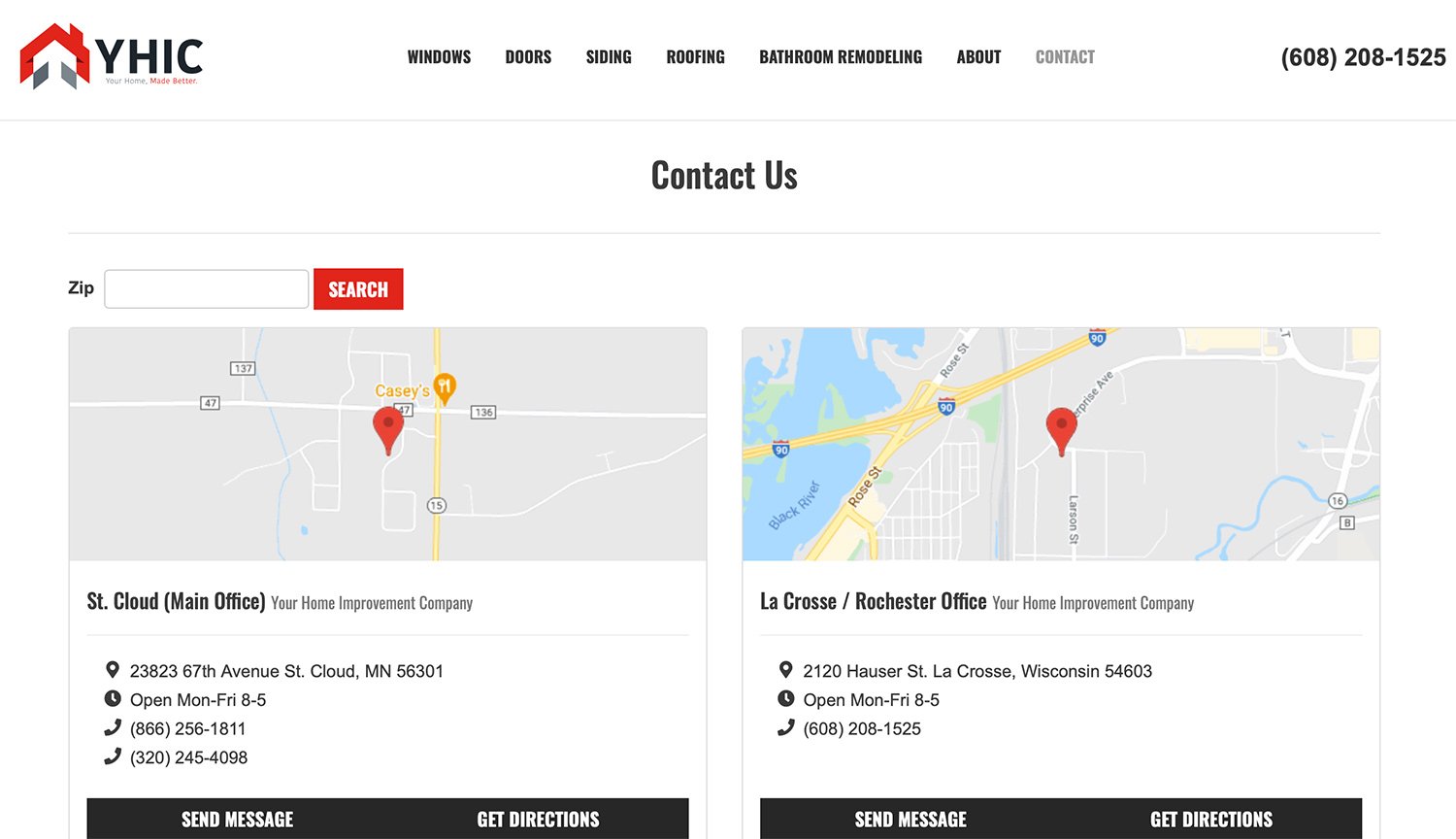
3 Things You'll Need for Your Website
You’ll need a menu bar that takes customers to the various pages on your website to encourage them to pick up the phone and call.
Besides that, you'll also need to think about these things:
1. Inquiry Form
If your contractor business depends on customers making appointments, you may want to consider a page with a calendar to easily schedule a time to meet. Add an inquiry or contact form so customers can post questions, arrange to meet, or just get in touch.
2. Content
While impactful colors and photos make a website attractive, content is needed to ensure your website shows up in search engine results. According to SEO guidelines and Google, longer content seems to rank higher. But it needs to be high quality content that is relevant and helpful for your customers.
3. Photos and Videos
Jobsite photos, before and after pictures of a remodeling project, and links to YouTube videos can enhance user experience and keep your customers engaged. In addition, photos add credibility and can often convey your capabilities better and more powerfully than words.
Where to Promote Your Website
Now that you have a working website, it’s important that people see it. You'll want to reach out to as many customers and potential customers as possible in your local area. You can do this by email, sending out a flyer announcing your new website, or by word of mouth at a local event.
If you've decided to add a blog to your site, you'll want to attract as many readers as possible. If you showcase before and after photos, you'll want people to see your work. Fortunately, there are many ways—both free and paid—to promote your website and generate traffic.
Create a pro account on Angi. Increase your exposure to millions of homeowners looking for a local contractor just like you.
Exchange backlinks. Partner with a complementary business or industry influencer and ask to add a link to your website to their site. Do the same on your site.
Post to your social media pages. Facebook now charges a fee to reach a broad audience. Twitter is great for short bursts of news. Pinterest and Instagram are the best platforms for posting pictures.
Make sure your content is keyword-rich. Using specific keywords will help you rank higher in search engines.
Start emailing customers. If you have a contact form on your site, ask potential customers who fill in their contact details if you can also email them with news and updates.
Guest blog. If a complementary business has a blog on their website, ask if you can guest blog. But be sure to add links to your website in the blog.
Create a LinkedIn page for your business. You can also write posts on LinkedIn about industry updates and news.
Post videos to YouTube. If you have a video showing a new technique or new product introduction, you can post it on YouTube and embed your website URL.
Join a Q&A forum. Quora is a great forum to answer questions about your field.
Email signature. Make sure your email signature has all of your contact information and a link to your website.
Become a contributor on HARO. People scour Help Out a Reporter (HARO) to find answers and get help for articles that match your expertise. Answer their questions and provide additional info.
Create (or Update) Your Contractor Website
Achieving awareness and visibility for your company is an investment that takes time and a little creativity on your part. You want to be recognized for your expertise, and your website can help make that happen. By consistently getting your company's name out into the marketplace with your website, you’ll be able to showcase your authority and earn the trust of your customers.
Sign up for an Angi pro account to get new leads who are looking to book a contractor right now.





- 7 Plumbing Website Must-Haves That’ll Help You Book More Jobs
- Landscaping Website Tips: What Landscapers Need for a Great Site
- How to Increase Contractor Leads: 5 Simple Steps
- 8 Tips to Get Landscaping Leads Fast
- Roofing Marketing Tips: 10 Impactful Ways to Market Your Roofing Company
- How to Sell Landscaping Services and Grow Your Business
- Plumber Marketing Tips: 10 Effective Ways to Promote Your Business
- Top Tips on Hiring the Perfect General Contractor for Your Next Project
- Landscaping Marketing Ideas: How to Stay Busy Through Every Season
- 5 Paving Contractor Marketing Ideas










